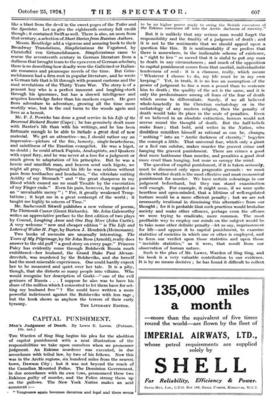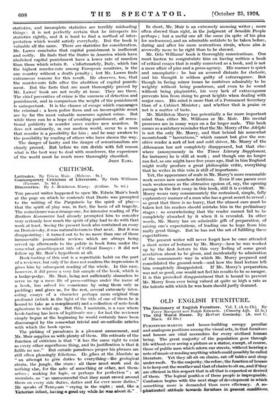CAPITAL PUNISHMENT.
THE Warden of Sing Sing begins his plea for the abolition of capital punishment with a neat illustration of the responsibilities we take upon ourselves when we pronounce judgment. An Eskimo murderer was executed, in due accordance with tribal law, by two of his fellows. Now this was in the Arctic regions, six hundred miles from the nearest town, Dawson City ; but it was not beyond the reach of the Canadian Mounted Police. The Dominion Government, in due accordance with its own laws, pronounced these two .Eskimos guilty of murder, and the Police strung them up on the gallows. The New York Nation makes an acid comment
• "Vengeance again becomes decorous and legal and there seems to be no higher powor ready to swing the British executors of the Eskimo executors off into the Arctic darkness of eternity."
But it is unlikely that any serious man would forget the responsibility and the finality of a judgment of death ; and it is not to the sentiments that we should appeal upon a question like this. It is sentimentality if we profess that there is somewhere, in the inalienable scheme of existence, a "right to live" so sacred that it is sinful to put any man to death in any circumstances ; and much of the opposition to capital punishment comes from that morbid, individualistic tenderness of soul : it is a clamour, really, which means "Whatever I choose to do, my life must be in My own keeping." Yet, in truth, it is no less an assumption of the power of judgment to fine a man a pound than to sentence him to death ; the quality of the act is the same, and it is only the predominance among all fears of the fear of death which seems to differentiate. Surely, if we all believed whole-heartedly in the Christian eschatology or in the eschatology of any modern religion, then the penalty of death would take its place in the scale of penalties. Even if we believed in an absolute extinction, horrors would not accrue round the thought of death. But the half-beliefs make fears ; that bold, acid writer in the Nation, who doubtless considers himself as rational as can be, changes " nothing " into an "Arctic darkness of eternity," bogyfies the concept a little. That universal fear, which only a giant or a fool can subdue, makes murder the gravest crime and hanging the gravest punishment. There are crimes a good deal more loathsome than murder, and penalties a good deal more cruel than hanging, but none so occupy the mind.
The question of capital punishment, if it is taken seriously, must be discussed only upon pragmatic grounds : we must decide whether death is the most effective and most economical punishment for murder. We have certain colourings in our judgment beforehand, but they can stand examination well enough. For example, it might seem, if we were quite heartless and open-minded, that a lifetime of -well-regulated torture would be a more efficient penalty ; but we are not necessarily irrational in dismissing this alternative from our thought ; for it is probable that such practices would brutalize society and make other offences, perhaps even the offence we were trying to eradicate, more common. The most profitable way to employ our minds on the subject would be to take some other definite penalty—let us say, imprisonment for life—and oppose it to capital punishment, to examine statistics of societies in which one or other is employed, and to form our verdict upon those statistics and upon those "invisible statistics," as it were, that result from our observation of human nature.
Such is the plan of Mr. Lawes, Warden of Sing Sing, and his book is a very valuable contribution to our evidence. It is by no means decisive ; he has found it difficult to collect
statistics, and incomplete statistics are terribly misleading things : it is not perfectly certain that he interprets his statistics rightly, and it is hard to 'find a method of inter- pretation which would satisfy everybody. But -the book is valuable all-the same. There are statistics for consideration. 'Mr. Lewes -concludes that capital punishment is inefficient and catty. He finds that the States in America which have abolished capital punishment have a lower rate of murders than those which retain it. iJnfortunatcly, Italy, which has the highest murder-rate among European countries, is the one country without a death penalty ; but Mr. Lewes finds extraneous reasons for this result. He observes, too, that the murder-rate falls after the abolition of capital punish- ment. But the facts that are most thoroughly proved by Mr. Lewes' book are not really at issue. They are these. 'The chief preventive of crime is the sureness of detection and punishment, and in comparison the weight of the punishment is unimportant. It is the chance of escape which encourages the criminal : a keen police force and an incorruptible court are by far -the most valuable measures against crime. But while there can be a hope of avoiding punishment, all sensa- tional publicity in murder cases excites new murders. It does not ordinarily, in our modern world, occur to a man 'that murder is a possibility for him ; and he may awaken to the possibility by reading of others who have shown the way.
The danger of laxity and the danger of sensationalism are clearly proved. But before we can decide with full reason what is the best way to deal with murderers, the experience -of the world must be much more thoroughly classified.
JorrN EARL.



























































 Previous page
Previous page